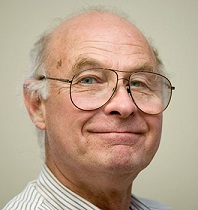Timothy Hart

Timothy Hart [1]
Timothy P. Hart, (September 18, 1939 - January 20, 2014 [2])
was an American computer scientist, in the 60s affiliated with Massachusetts Institute of Technology, and in 1970 co-founder of Evans, Griffiths and Hart, Inc, EGH. As MIT graduate Timothy Hart was involved in the initial development of LISP within the group of John McCarthy. Along with Daniel Edwards, Timothy Hart wrote a memo on Alpha-Beta in December 1961, revised version in 1963 [3]. It also contains a Theorem by Michael Levin, the well known formula of the number of leaf nodes that need to be examined in Alpha-Beta.
Quotes
Alpha-Beta
Quote by John McCarthy from Human-Level AI is harder than it seemed in 1955 on the Dartmouth workshop:
Chess programs catch some of the human chess playing abilities but rely on the limited effective branching of the chess move tree. The ideas that work for chess are inadequate for go. Alpha-beta pruning characterizes human play, but it wasn't noticed by early chess programmers - Turing, Shannon, Pasta and Ulam, and Bernstein. We humans are not very good at identifying the heuristics we ourselves use. Approximations to alpha-beta used by Samuel, Newell and Simon, McCarthy. Proved equivalent to minimax by Hart and Levin, independently by Brudno. Knuth gives details.
LISP
Quote by John McCarthy in History of Lisp [4]:
Many people participated in the initial development of LISP, and I haven't been able to remember all their contributions and must settle, at this writing, for a list of names. I can remember Paul W. Abrahams, Robert Brayton, Daniel Edwards, Patrick Fischer, Phyllis Fox, Saul Goldberg, Timothy Hart, Louis Hodes, Michael Levin, David Luckham, Klim Maling, Marvin Minsky, David Park, Nathaniel Rochester of IBM, and Steve Russell.
See also
Selected Publications
- Daniel Edwards, Timothy Hart (1961). The Alpha-Beta Heuristic. AIM-030
- John McCarthy, Paul W. Abrahams, Daniel Edwards, Timothy Hart, Michael Levin (1962) LISP 1.5 Programmer's Manual. The M.I.T. Press, second edition (1985) as pdf [6]
- Timothy Hart (1963). A Proposal for a Geometry Theorem Proving Program. AIM-056
- Timothy Hart (1963). MACRO Definitions for LISP. AIM-057
- Timothy Hart, Michael Levin (1964). LISP Exercises. AIM-064
- Robert A. Yates, Bertram Raphael, Timothy Hart (1970). Resolution Graphs. Artificial Intelligence Vol. 1, No. 4, pdf
References
- ↑ Timothy P. (Tim) Hart y Michael I. Levin | Escuela Técnica Superior de Ingeniería de Sistemas Informáticos (Spanish)
- ↑ Timothy P. Hart Obituary - Cambridge, MA | ObitTree™
- ↑ Daniel Edwards, Timothy Hart (1961). The Alpha-Beta Heuristic. AIM-030
- ↑ John McCarthy (1979). History of Lisp. Chapter 4, From LISP 1 to LISP 1.5
- ↑ dblp: Timothy P. Hart
- ↑ McCarthy et al. LISP 1.5 Programmer's Manual. from The Computer History Museum Software Preservation Group